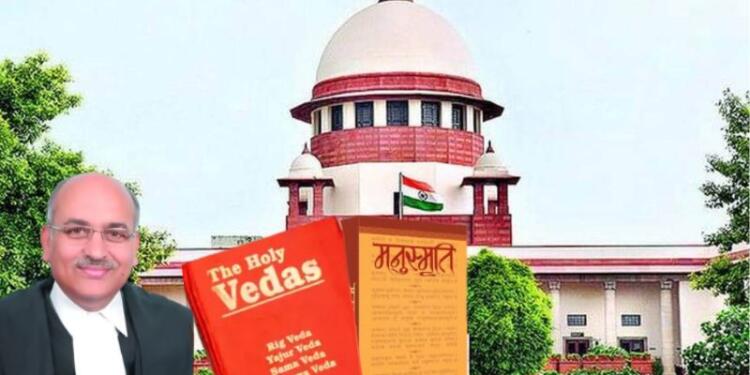At a time when smear campaigns against ancient Hindu scriptures are in full swing, Supreme Court Judge Justice Pankaj Mithal has advocated for the inclusion of Ancient Indian legal and philosophical traditions in the Law schools’ curriculum. Justice Mithal emphasised that the study of Vedas, Upanishads, Smritis, Manusmriti and Arthashastra are indispensable if we are to understand the roots of Indian legal reasoning.
“It is time that our law schools formally incorporate the ancient Indian legal and philosophical traditions into the curriculum. The Vedas, the Smritis, the Arthashastra, the Manusmriti, the Dhammas of Ashoka, and the epics of Mahabharata and Ramayana are not merely cultural artefacts—they contain deep reflections on justice, equity, governance, punishment, reconciliation, and moral duty. Their study is indispensable if we are to understand the roots of Indian legal reasoning,” Justice Mithal has been quoted saying by Legal portal Bar and Bench.
He continued by proposing that a subject on ‘Dharma and Indian Legal Thought’ or ‘Foundations of Indian Jurisprudence’ should be included in the law school curriculum.
He stated, “I propose that law colleges and universities introduce at least one dedicated subject that explores these ancient concepts—perhaps under the title ‘Dharma and Indian Legal Thought’ or ‘Foundations of Indian Jurisprudence’. This course should not be confined to a textual reading but must draw connections between classical Indian ideas of justice and their modern constitutional reflections.”
According to Justice Mithal, such a subject would not only provide students with cultural and intellectual grounding, but also help shape a uniquely Indian jurisprudential imagination.
Apart from Hindu scriptures like Manusmriti, Justice Mithal added, “Just as Western students read Roman law and canonical texts of legal philosophy, Indian students must become conversant with the juristic ideas of Yajnavalkya, Kautilya, Manu, and Ashoka. This is not a project of nostalgia—it is a project of rooted innovation.”
Justice Mithal addressed the inaugural ceremony of the Legal Conclave marking the 75 years of the Supreme Court of India.
Justice Mithal stressed that one should imagine a generation of lawyers and judges who understand Article 14 not just as a borrowed principle of equality, but also as an embodiment of Samatva.
According to him, one should view environmental law not just through statutes but through the reverence for Prakriti in the Vedas and understand alternative dispute resolution as a continuation of panchayat traditions and grasp constitutional morality as a modern articulation of ancient Rajadharma.
He stated, “The Court’s role is to ensure that constitutional morality triumphs over executive expediency, that justice is not sacrificed to political convenience, and that the rule of law is not reduced to a rule of power.”



























